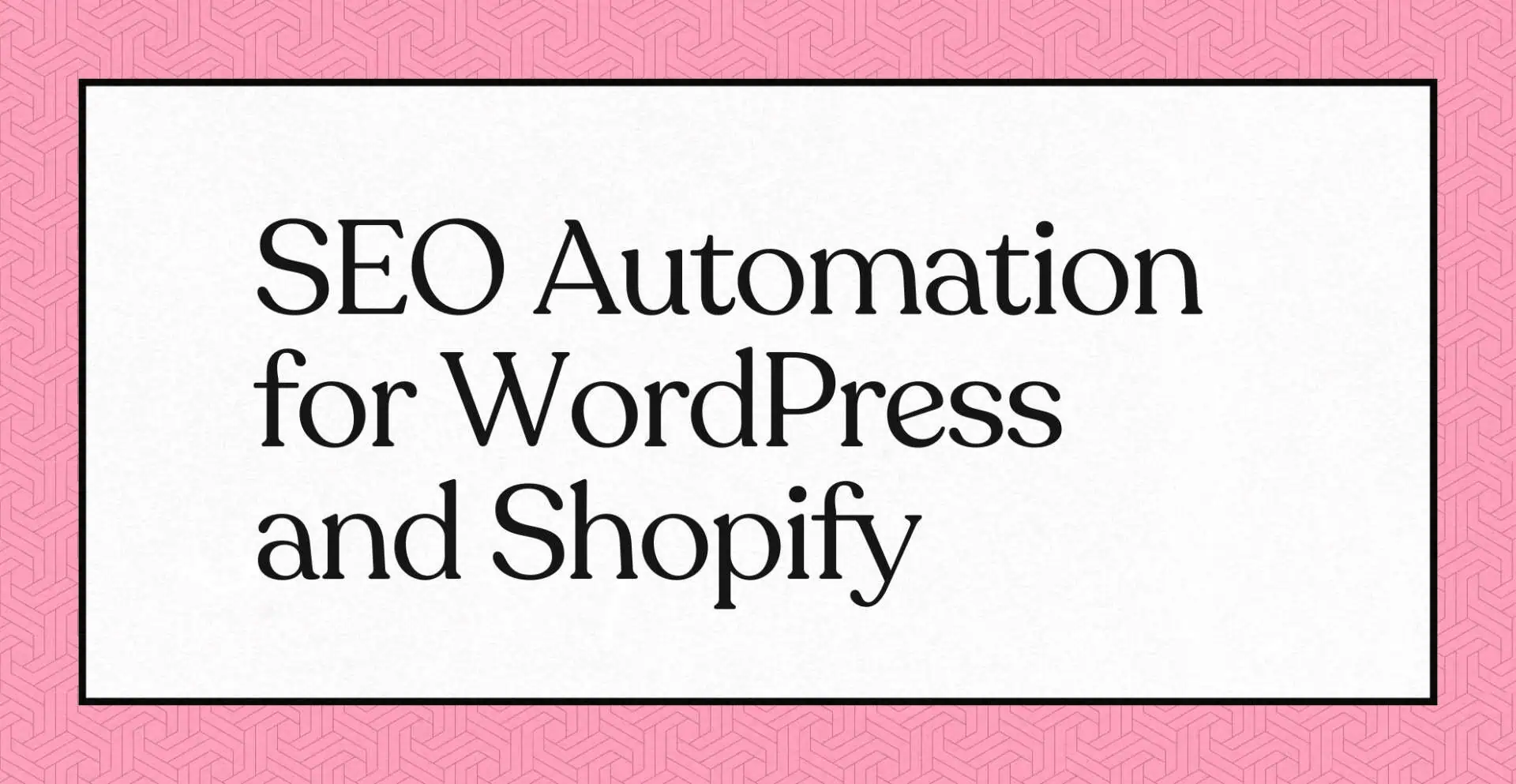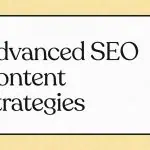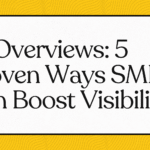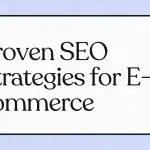Summary
SEO Automation for WordPress and Shopify streamlines repetitive SEO tasks at scale, tackling duplicate content, bulk metadata, schema markup, technical audits, rank tracking, and NLP-driven content optimization to boost organic traffic and conversions. WordPress relies on powerful plugins like AIOSEO, Rank Math, and Yoast for deep customization, while Shopify favors app-driven simplicity via Avada, Booster SEO, TinyIMG, and specialized tools such as Ilana’s JSON-LD. Platform-agnostic solutions including Alli AI, OTTO SEO, Surfer SEO, Semrush, SEO.AI, and Ahrefs integrate across stacks to automate on-page updates, technical fixes, content briefs, internal linking, and real-time monitoring for faster, more consistent results.
SEO Automation for WordPress and Shopify is changing how site owners, marketers, and store managers approach optimisation. Managing hundreds or thousands of product pages or articles manually is no longer sustainable. On Shopify, duplicate content and repetitive product-level SEO tasks can quickly eat into your time. On WordPress, keyword research, content brief creation, technical audits, and analytics reporting can become an overwhelming cycle.
Manual processes make scaling more difficult, but SEO Automation for WordPress and Shopify streamlines repetitive workflows, freeing you to focus on strategy. Industry data shows that only a fraction of SEO professionals believe traditional methods keep pace with competitive demands, while those adopting SEO Automation for WordPress and Shopify report saving hours each week and improving campaign precision.
The advantage of SEO Automation for WordPress and Shopify is its ability to combine speed and accuracy. AI-driven tools can dynamically optimise metadata, generate structured content outlines, detect technical errors, and monitor rankings in real-time tasks that once required entire teams. This efficiency improves consistency, reduces human error, and ensures your site adapts more quickly to algorithmic changes.
In this guide, you’ll learn how SEO Automation for WordPress and Shopify tools work, the differences in implementation for each platform, and how to leverage advanced technologies like machine learning and natural language processing to push your SEO further. You’ll also discover automation best practices to make gains sustainable, from content scheduling to backlink monitoring.
For e-commerce brands on Shopify and publishers on WordPress, adopting SEO Automation for WordPress and Shopify is the key to scaling reach, increasing organic traffic, and improving conversion rates in an environment where speed and precision decide market leaders.
Software’s SEO Automation for WordPress and Shopify
The rising demand for speed and precision in search optimisation has driven rapid growth in SEO automation tools for WordPress and Shopify. Options now range from platform-specific plugins and apps that integrate tightly with each CMS to advanced, platform-agnostic solutions that work across multiple environments. Knowing how SEO Automation for WordPress and Shopify fits into your operations is the first step to choosing a solution that delivers measurable, lasting results.
At its core, SEO Automation for WordPress and Shopify focuses on eliminating repetitive processes, delivering actionable, data-driven insights, and ensuring every change aligns with proven best practices. This automation allows teams to keep their SEO foundation solid without being weighed down by constant manual work.
From continuous site monitoring and precise rank tracking to deep backlink analysis and competitor intelligence, SEO Automation for WordPress and Shopify tools dramatically reduce the time spent on technical upkeep. This gives your team more bandwidth for high-value strategic initiatives, enabling a faster, more agile SEO process that keeps pace with shifting algorithms and competitive markets.
We can broadly categorise these tools:
- WordPress SEO Plugins: These tools are installed directly into the WordPress dashboard, offering deep integration with the CMS. They often provide real-time feedback within the editor and leverage WordPress’s flexibility for customisation. Examples include AIOSEO, Rank Math, and Yoast SEO.
- Shopify SEO Apps: These apps in the Shopify App Store are designed for ease of use within the Shopify ecosystem. They often focus on eCommerce SEO automation tasks, such as optimising product pages, managing extensive catalogues, and simplifying technical aspects like schema markup. Examples include Avada SEO Suite, Booster SEO & Image Optimiser, and TinyIMG.
- Platform-Agnostic Tools & Integrations: These are often Software-as-a-Service (SaaS) platforms or tools that integrate with WordPress and Shopify (and potentially other platforms) via APIs, code snippets, or browser extensions. They may offer broader or more advanced functionality that isn’t constrained by the native CMS environment. Examples include Alli AI, OTTO SEO, Surfer SEO, SEO.AI, Semrush, and Ahrefs.
The sheer number of available options can be overwhelming. The choice often depends on whether a user prioritises seamless integration within their chosen CMS (plugins/apps) or seeks potentially more powerful, platform-independent capabilities offered by external tools, some of which can bypass inherent CMS limitations.
Furthermore, a noticeable trend is the emergence of “all-in-one” solutions within each ecosystem, such as AIOSEO and Rank Math for WordPress or Avada and Booster SEO for Shopify.
These tools provide a comprehensive suite of automation features, covering on-page optimisation, technical audits, image optimisation, and more, with simplified tool management.
However, this convenience might come at the cost of depth in specific areas. Users requiring best-in-class functionality for a particular task, such as complex schema implementation or highly advanced content analysis, may still find specialised tools like Ilana’s JSON-LD for Shopify or Surfer SEO for content optimisation to offer superior capabilities.
This presents a key decision point: prioritising the breadth and convenience of an all-in-one solution versus the depth and specialisation of dedicated tools.
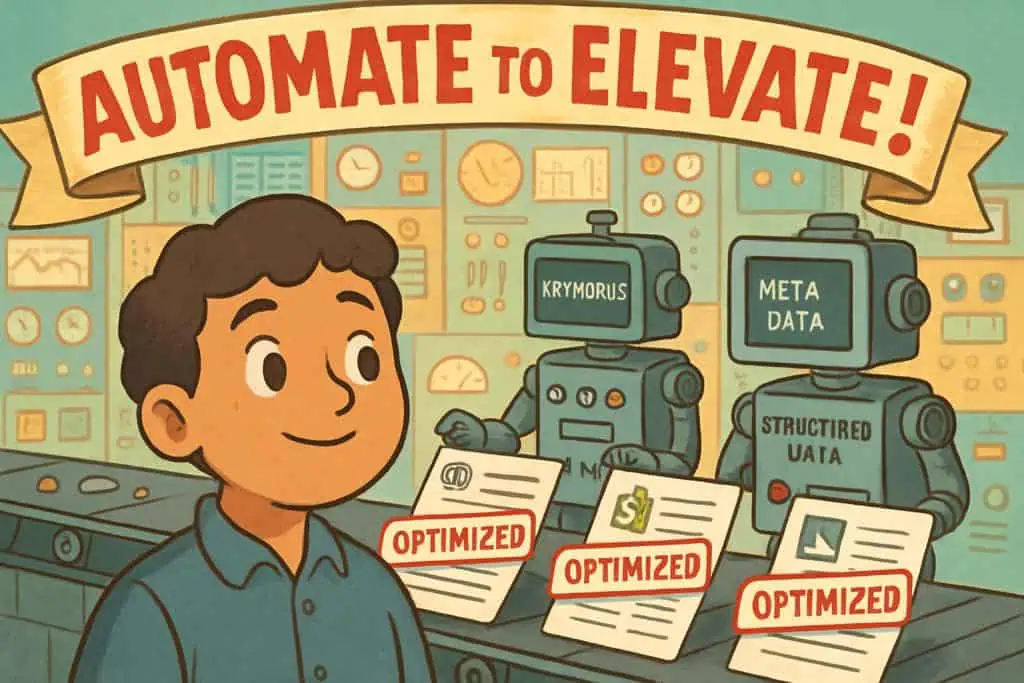
Top SEO Automation Tools
Navigating the diverse array of SEO automation tools requires understanding their specific strengths, features, and suitability for WordPress, Shopify, or both. Below is an analysis of leading tools and a comparative table to aid selection.
WordPress-Centric Plugins
- All-in-One SEO: A highly popular WordPress plugin known for its comprehensive features and user-friendly interface. It boasts AI-driven capabilities, including an AI Writing Assistant for real-time content optimisation, automated title/meta description generation, TruSEO on-page analysis with actionable checklists, automated schema markup (+ types), smart XML sitemaps (including video and news), and an intelligent Link Assistant for internal linking suggestions. It also offers strong WooCommerce and Local SEO modules. AIOSEO aims to be a complete solution within the WordPress dashboard
- Rank Math: Another powerful WordPress SEO plugin, often praised for its extensive free feature set and affordable premium plans. Its “Content AI” provides optimisation suggestions directly within the WordPress editor, similar to tools like Clearscope or Frase. It includes AI keyword suggestions, schema automation, robust WooCommerce and Local SEO features, and integrations with Google Search Console and Analytics. It seamlessly integrates with popular page builders like Elementor and Divi.
- Yoast SEO (Premium): A long-standing favourite in the WordPress community. The premium version introduces AI features (currently in beta) to generate titles/meta descriptions and provide content optimisation suggestions.2 It allows optimisation for multiple keywords/synonyms, features an advanced linguistic analysis engine, automatic redirects to prevent four errors, and integrations with Semrush, Wincher, and Elementor. Yoast offers specialised add-ons for WooCommerce, Local, Video, and News SEO
Shopify-Focused Apps:
- Avada SEO Suite: A generalist “does-it-all” app for Shopify, comparable to Yoast for WordPress. Key features include image optimisation (alt tags, compression, renaming), page speed enhancements (lazy loading, minification), JSON-LD schema implementation, meta tag automation, sitemap generation, and fundamental SEO analysis. It offers both free and paid plans.
- Booster SEO & Image Optimiser: This tool focuses on comprehensive SEO automation for Shopify stores. It continuously monitors the site for SEO issues using AI and offers one-click optimisation for image alt text, meta tags, broken links, and more. Features include image compression, keyword tracking, and SEO audit.s
- TinyIMG stands out for its robust free plan and features, including bulk metadata and alt text editing, JSON-LD automation without coding, comprehensive image optimisation (compression and resizing), and site audits for SEO and speed issues. It is recommended for automating tedious tasks.
- SEO Manager: Another all-in-one app noted for being beginner-friendly. It automates meta tags, alt text, and schema markup. It integrates Google Analytics and Trends into its dashboard and provides a real-time SEO audit.s
- SearchPie: SEO, Speed & Schema: A comprehensive app focusing on keyword optimisation, meta-tag management, and local visibility. Features include automated meta tag generation, keyword suggestions, automatic SEO issue fixes, backlink analysis, and multilingual support.
- Other Notable Shopify Apps: Smart SEO (automation focus, multilingual support ), SEOAnt (AI-based automation, ChatGPT content gen, competitor analysis ), Ilana’s JSON‑LD for SEO (specialised in structured data automation ), TreeBrain (AI content generation for blogs/products ), and Shopify’s native Shopify Magic AI assistant.
Platform Agnostic / Integrations:
- Alli AI: A unique platform that works with any CMS (including WordPress and Shopify) by installing a code snippet. Its primary strength is its ability to bypass CMS limitations to implement advanced technical SEO and bulk on-page optimisations. Features include automated technical fixes (canonical tags, URL cleanup), bulk meta tag optimisation, AI-generated content, and real-time deployment of changes. Testimonials highlight significant traffic improvements.
- OTTO SEO (by Search Atlas): Like Alli AI, OTTO uses a pixel installed in the website header to automate SEO across platforms such as WordPress, Shopify, and Wix. It claims to automate % of SEO tasks, including technical fixes (meta tags, broken links, canonicals, alt tags), content optimisation using NLP entity analysis, AI content creation (via Claude/ChatGPT), Google Business Profile optimisation (reviews, Q&A, posts), and 1-click publishing to WP/Shopify.
- Surfer SEO: Primarily a content optimisation tool that integrates with various platforms, including WordPress, Google Docs, Jasper, and ChatGPT. Its AI Content Editor provides real-time optimisation scores and suggestions based on SERP analysis. Features include keyword research and clustering (Topical Map), automated content brief/outline generation, NLP analysis, plagiarism checking, and auto internal linking.
- SEO.AI: Focuses on creating SEO-optimised content using AI. It features an AI writer for articles, descriptions, and product feeds; real-time SEO scoring; advanced keyword insights (gaps, frequency, and intent analysis using NLP); an AI-optimised product feed for platforms like Google Shopping; and integrations with WordPress, Shopify, Google Search Console, and Merchant Centre.
- Semrush: A comprehensive SEO suite offering many tools, including keyword research, site audits, competitor analysis, rank tracking, and backlink analysis. It incorporates AI through features such as ContentShake AI (content ideas and optimisation), AI Writing Assistant, and Semrush Copilot to manage multiple sites. Integrates with WordPress
- Ahrefs: Renowned for its powerful backlink analysis capabilities, Ahrefs also offers strong tools for keyword research, site audits, content exploration, and rank tracking. It leverages machine learning in features like its content explorer and site audit tool.
WordPress vs. Shopify: How SEO Automation for WordPress and Shopify Differs
Choosing between WordPress and Shopify involves weighing flexibility against simplicity, and this choice directly affects how SEO automation is implemented for each platform. Both platforms can deliver powerful automation, but their structures, ecosystems, and workflows shape different approaches, challenges, and best practices.
Flexibility vs. Simplicity in SEO Automation for WordPress and Shopify
WordPress, as an open-source platform, provides unmatched flexibility and control. Users can modify underlying code, customise every SEO element, and apply advanced automation techniques. This makes it ideal for content-heavy sites or businesses with unique SEO needs. However, SEO automation for WordPress and Shopify works very differently. Here, WordPress requires a steeper learning curve, more technical skill, and ongoing management. While WordPress software is free, hosting, premium themes, and essential plugins can increase overall costs.
Shopify, on the other hand, prioritises ease of use. Its intuitive interface and guided setup are perfect for e-commerce businesses seeking a fast launch without deep technical expertise. With SEO automation for WordPress and Shopify, Shopify’s built-in features, such as automatic sitemaps and canonical tags, handle the basics. At the same time, the advanced capabilities come from third-party apps in the Shopify App Store. It’s simpler to manage but offers less control over technical SEO than WordPress. Costs are billed monthly, with optional premium themes and apps.
Plugins vs. Built-In Features and Apps
The SEO automation implementation strategy for WordPress and Shopify mirrors the platforms’ core designs.
- WordPress Automation: Users rely on plugins such as Yoast SEO, Rank Math, or AIOSEO to automate tasks. These tools integrate deeply with WordPress, offering real-time analysis, granular settings control, and automation for tasks like meta generation, schema management, and content optimisation.
- Shopify Automation: Users leverage built-in SEO basics and extend capabilities with apps such as Avada, SEO Manager, or TinyIMG. These apps focus on specific eCommerce automation needs such as bulk meta updates, image optimisation, or structured data. While easy to install, they typically provide less customisation depth than WordPress plugins and often involve recurring subscription costs.
In short, SEO automation for WordPress and Shopify can be equally effective. Still, the execution differs: WordPress favours flexibility and customisation through powerful plugins, while Shopify offers a streamlined, app-driven approach focused on ease of use.
Technical SEO Control & Automation
Key technical differences impact automation possibilities:
- URL Structure: WordPress allows fully customisable permalinks, which is crucial for SEO-friendly URLs. Shopify enforces a rigid structure (e.g., /collections/, /products/, /pages/) that limits optimisation potential. While tools like Alli AI claim to help manage URL issues, fundamental control rests with WordPress.
- Sitemaps: Shopify automatically generates a basic XML sitemap. WordPress plugins offer greater control, enabling different sitemap types (e.g., image, video, news) and customisation.
- Robots.txt: WordPress users can edit their robots.txt file directly for precise crawler instructions. Shopify restricts direct editing, offering limited control through its interface or specific apps.s
- Site Speed: Shopify provides a strong baseline with its optimised hosting infrastructure and built-in CDN. WordPress speed largely depends on the chosen hosting provider and optimisation plugins (such as WP Rocket or LiteSpeed Cache), which require more manual setup and configuration. Both platforms can suffer performance issues if overloaded with poorly optimised themes or excessive apps/plugins. Automation tools can assist with image and code optimisation on both platforms.
- Schema Markup: Implementing structured data is generally easier and more flexible on WordPress with plugins that support multiple schema types and customisation options. Shopify often requires dedicated apps (such as Ilana’s JSON-LD or Schema Plus) or manual code injection to implement a comprehensive schema, though automation tools are increasingly simplifying this process.
Platform-Specific Challenges & Automated Solutions
Each platform presents unique challenges that automation can help address:
- WordPress: Due to “plugin bloat,” there is a risk of plugin conflicts, theme compatibility issues, and site speed degradation. While there is no direct automation for resolving disputes, tools can help monitor site health, speed, and optimise assets. Some platforms, such as Alli AI, specifically aim to mitigate issues caused by plugin overload.
- Shopify: Prone to duplicate content issues arising from product variants and collection structures. Manual scaling of on-page optimisation across extensive product catalogues is time-consuming. Restricted access to certain backend features can hinder advanced optimisation. Shopify SEO plugins (apps) and platform-agnostic tools directly address these issues by offering bulk editing of meta tags and alt text, automated canonical tag management, URL structure cleanup suggestions, and the ability to bypass platform restrictions through direct code manipulation (e.g., Alli AI, OTTO).
The inherent e-commerce focus of Shopify means its native features and popular apps are often preconfigured to optimise products, collections, and relevant schema. This can provide a quicker start for basic eCommerce SEO automation. Even with WooCommerce, WordPress typically requires a more deliberate setup using plugins to achieve equivalent e-commerce-specific automation.
However, its strength in content management gives it an edge for complex content marketing strategies integrated with SEO automation.
Ultimately, while Shopify’s limitations in deep technical customisation (like URL structures and robots.txt access ) are fundamental, many core SEO automation tasks – on-page analysis, meta generation, image optimisation, schema implementation, internal linking, site audits – are achievable on both platforms using the available tools.
For many users whose primary goal is automating these common workflows, the practical difference might be less about fundamental capabilities and more about the user experience, ease of integration, specific e-commerce needs, and the overall cost of the chosen tools and platform.
How Automation Streamlines Tasks with SEO Automation for WordPress and Shopify
SEO automation for WordPress and Shopify is reshaping how optimisation is done, shifting from slow, manual, error-prone workflows to streamlined, data-driven systems that operate at scale. By automating high-impact tasks across content creation, technical audits, and analytics, businesses can achieve more in less time, maintain consistent quality, and adapt faster to market and algorithm changes.
Transforming Content Creation & Optimisation with SEO Automation for WordPress and Shopify
The content lifecycle is one of the biggest beneficiaries of SEO automation for WordPress and Shopify.
- Content Ideation & Generation: Tools such as Surfer SEO’s Topical Map, Ahrefs’ blog post ideas generator, and AI writing platforms such as ChatGPT, Jasper, SEO.AI, OTTO, and TreeBrain can generate topic ideas, analyse competitors, and produce draft blog posts, product descriptions, or outlines. While automation accelerates this process, human editing remains vital for accuracy and brand alignment.
- Content Brief Automation: Platforms such as Surfer SEO, Frase, and MarketMuse can automatically create content briefs by analysing top-ranking pages. This accelerates research, outlines the structure, suggests keywords, and provides writers with a detailed roadmap that is crucial for effective SEO automation on WordPress and Shopify.
- Real-Time On-Page Optimisation: Integrated tools like AIOSEO’s TruSEO, Rank Math’s Content AI, Yoast, and Surfer’s Content Editor give immediate feedback on keyword use, readability, meta tags, and internal linking. Some, such as OTTO, even automatically insert relevant NLP entities.
Automating Meta Tag Generation & Management through SEO Automation for WordPress and Shopify
Meta tags are a perfect example of where SEO automation for WordPress and Shopify shines, especially for sites with hundreds or thousands of pages.
- AI Title & Description Generation: Solutions such as CapstonAI, AIOSEO, Yoast Premium, Alli AI, OTTO, and SEO.AI can auto-generate optimised meta titles and descriptions tailored to content and target keywords.
- Bulk Editing & Templates: Shopify SEO plugins (Avada, SEO Manager, TinyIMG, SEOAnt, Optim) and WordPress tools support applying meta tag templates and bulk updates, core time-saving features of SEO automation for WordPress and Shopify.
- Automated Image Alt Text: Plugins such as Rank Math, Slim SEO, Avada, Booster SEO, and TinyIMG can automatically generate descriptive alt text, improving accessibility and image SEO with minimal manual effort.
Proactive Technical SEO Audits & Monitoring with SEO Automation for WordPress and Shopify
Technical SEO moves from periodic checkups to continuous monitoring with SEO automation for WordPress and Shopify.
- Scheduled Site Crawls: Tools such as Screaming Frog, Semrush, Ahrefs, Moz, and SE Ranking can be configured to crawl daily, weekly, or monthly, flagging issues before they cause damage.
- Automated Issue Detection: From broken links and server errors to duplicate content, redirect issues, missing meta tags, and schema errors, automated crawls ensure nothing slips through the cracks.
- Performance Monitoring: Apps such as TinyIMG and Avada can compress images, minify code, and maintain competitive page speed, which is vital for SEO automation and success on WordPress and Shopify.
- Real-Time Alerts: Platforms such as SearchAtlas/OTTO or SE Ranking send instant notifications when critical issues occur, enabling swift fixes and preventing ranking drops.
With SEO automation for WordPress and Shopify, site owners and marketers can replace repetitive manual tasks with intelligent systems that run around the clock, delivering faster results, greater consistency, and the competitive edge needed in today’s fast-moving digital landscape.
Sources
- Shopify SEO Automation Using AI – Alli AI, accessed April 30, 2025, https://www.alliai.com/ai-shopify-seo-automation.
- WordPress SEO Automation Using AI – Alli AI, accessed April 30, 2025, https://www.alliai.com/ai-wordpress-seo-automation.
- Save Time & Money With SEO Automation Tools Today! – Eaglytics Co, accessed April 30, 2025, https://eaglytics-co.com/how-seo-automation-tools-save-time-and-money/
- SEO automation vs manual SEO: Pros and cons – WP SEO AI, accessed April 30, 2025, https://wpseoai.com/blog/seo-automation-vs-manual-seo-pros-and-cons/
- AI-Powered SEO vs. Traditional Methods: A Data Comparison in 2025 – SEOmator, accessed April 30, 2025, https://seomator.com/blog/ai-powered-seo-vs-traditional-methods-comparison
- AI SEO for WordPress: 2025 Trends and Best Tools – Uxify, accessed April 30, 2025, https://uxify.com/blog/post/ai-seo-wordpress-tools-and-tips
- 7+ Best AI SEO Tools for WordPress [Automate Optimisation] – WPForms, accessed April 30, 2025, https://wpforms.com/best-ai-seo-tools-for-wordpress/
- Search Engine Optimisation Plugins – WordPress.com, accessed April 30, 2025, https://wordpress.com/plugins/browse/seo/.
- Shopify SEO: 11 of The Best Apps to Optimise Your Site in 2023 – Content Powered, accessed April 30, 2025, https://www.contentpowered.com/blog/shopify-seo-apps-optimize/
- Best Technical SEO Tools for Improving Your Website’s Performance (2024) – Shopify, accessed April 30, 2025, https://www.shopify.com/blog/technical-seo-tools
- 15 Best Shopify SEO Apps to Rank Higher in 2025 – LitExtension, accessed April 30, 2025, https://litextension.com/blog/best-shopify-seo-apps/
- Best SEO Apps For 2025 – Shopify App Store, accessed April 30, 2025, https://apps.shopify.com/categories/store-design-site-optimization-seo/all
- Surfer | SEO Content Optimisation Platform, accessed April 30, 2025, https://surferseo.com/
- WordPress SEO Plugin With Whip-Smart AI – AIOSEO, accessed April 30, 2025, https://aioseo.com/ai-seo-tools-wordpress/
- E-commerce SEO Automation Using AI – Alli AI, accessed April 30, 2025, https://www.alliai.com/ai-ecommerce-seo-automation
- SEO Automation for 9 Manual Tasks – Surfer SEO, accessed April 30, 2025, https://surferseo.com/blog/seo-automation/
- 10 Ways to Use Machine Learning SEO Algorithms in 2023 | The HostPapa Blog, accessed April 30, 2025, https://www.hostpapa.com/blog/web-design-development/ways-to-use-machine-learning-seo-algorithms/
- Automated SEO software: The #1 Automatic Optimisation Tool, accessed April 30, 2025, https://seo.ai/features/automated-seo-software
- 11 Best SEO Automation Tools to Boost Your Execution – OMNIUS, accessed April 30, 2025, https://www.omnius.so/blog/best-seo-automation-tools
- https://www.alliai.com/ai-and-automation/automate-onpage-seo
- SEO Automation Guide: Simplify and Supercharge Workflows – Traffic Think Tank, accessed April 30, 2025, https://trafficthinktank.com/seo-automation-guide/
- NLP in SEO: How to Optimise Your Site for Search Intent – SEOptimer, accessed April 30, 2025, https://www.seoptimer.com/blog/nlp-seo/
Q&A
Q: What is SEO automation for WordPress and Shopify,y and why does it matter for eCommerce SEO at scale?
A: It automates metadata, schema, audits, rank tracking, and content optimisation, saving hours and improving consistency across extensive catalogues.
Q: Which WordPress plugins lead SEO automation for content and technical tasks?
A: AIOSEO, Rank Math, and Yoast provide AI titles/descriptions, CapstonAI, TruSEO-style analysis, schema automation, sitemaps, and internal linking assistants.
Q: Which Shopify apps best handle bulk SEO, image optimisation, and structured data?
A: Avada, Booster SEO, TinyIMG, SEO Manager, and SearchPie automate meta tags, alt text, compression, JSON-LD, audits, and speed improvements.
Q: When should teams choose platform-agnostic SEO automation tools over CMS plugins or apps?
A: Use Alli AI, OTTO SEO, Surfer SEO, Semrush, SEO.AI, or Ahrefs when you need cross-platform deployment, advanced technical fixes, and SERP-driven content workflows.
